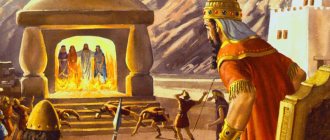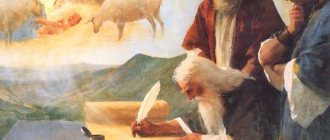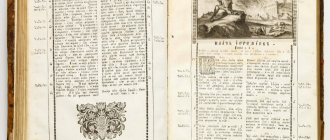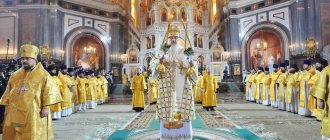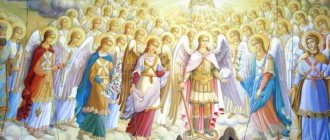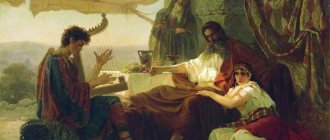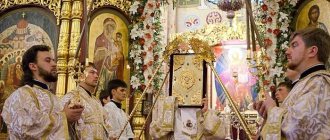The book of the prophet Jeremiah is the 24th book of the Old Testament in the biblical canon. Authorship is attributed to the prophet Jeremiah. The book of Jeremiah was written in Judea and partly in Egypt. The book was probably completed in 580 BC. e. The prophet described the historical events of 647-580. BC e.
Jeremiah was the prophet of Judah in the days of its decline and destruction. The speeches of the prophet Jeremiah illuminated the spiritual darkness that reigned in the Southern Kingdom.
Introduction.
In those dark days leading up to the destruction of Judah, Jeremiah was its chief prophet. His mournful figure seemed to rise at the deathbed of the Southern Kingdom. As a divinely guided teacher and harbinger, Jeremiah left an indelible mark. And although for a short time there also flashed on the spiritual horizon of Judea the light emanating from other prophets who lived in the same days, such as Habakkuk and Zephaniah, Jeremiah, in comparison with them, can be likened to a flaming torch. Along with Ezekiel, who prophesied in Babylon, he illuminated the spiritual darkness that enveloped Judah with the piercing bright light of God's word. Prophesying to a people who had strayed from God, Jeremiah spoke and wept.
Author.
Jeremiah was born around 645 BC, at the end of the reign of the wicked Manasseh. In 1:1 we read that he, Jeremiah the son of Hilkiah, was the author of this book. The meaning of the name "Jeremiah" is difficult to determine. Derived from different verbs, they get different meanings: “Jehovah establishes,” “Jehovah exalts,” or “Jehovah rejects.” Hilkiah, the father of the prophet, was a priest, a member of the Levitical community, which had long settled in Anathoth, a town located near Jerusalem, northeast of this city. The Levitical families that made up this community were expelled from the capital by King Solomon.
Firmly adhering to the traditions of antiquity with its patriarchal simplicity and reverently keeping the covenants of Moses, they were proud of both their past and their isolation from the kings of Judah. Note that Anathoth was one of those cities that were allocated to the descendants of Aaron, the high priest, by Joshua during the division of the land of Canaan (Joshua 21:15-19). Like Ezekiel (Ezekiel 1:3) and Zechariah (Zechariah 1:1), Jeremiah came, therefore, from a priestly family. However, there is no indication that he ever served as a priest in Jerusalem.
Imagining the mood that prevailed among the Levites of Anathoth, it is not difficult to understand that from childhood Jeremiah must have heard stories about the persecution in Jerusalem of the zealots of the true faith and about the death of those of them who boldly professed it. Thoughts about the tragic fate of the apostate Jewish people, and the internal search for ways of correction and salvation, probably began to occupy Jeremiah early. And one day he clearly heard a voice that sounded inside him: a voice called him to proclaim the will of the Lord to people, for the Lord, even before the birth of Jeremiah, destined him to become a “prophet to the nations” (1:4 ff).
This was “in the thirteenth year of the reign” of godly Josiah (1:2). Jeremiah's ministry continued from this time until the resettlement of the Jerusalemites to Babylon. He thus prophesied from about 627 to 586 BC. But chapters 40-44 of the Book of the Prophet Jeremiah essentially indicate that his prophetic ministry continued after the fall of Jerusalem, probably until 582 (at least).
One cannot help but say something about the personality of the prophet and the peculiarities of his religious feeling, his perception of God. He was a man of a soft, delicate nature, and at the same time an unswervingly firm faith, with which he overcame his human “weakness”, at the cost of constant bitter suffering. His prophetic calling predetermined his position as an outcast, misunderstood and even hated not only by his fellow citizens, but also by his relatives.
Just as Isaiah once called on the Jews not to rush to throw off the Assyrian yoke, so Jeremiah, a century later, called on them to submit to the Chaldeans, and this by no means made him “popular.” The tragedy of Jeremiah’s situation was also determined by the fact that he had to, preaching and prophesying, call his people to return to Jehovah and submit to His will, realizing at the same time that his calls would sound in vain: the people would not understand him and, listening, would not hear him, but the state the Jews will fall, as was predicted by Isaiah.
And yet he, an enemy and traitor in the eyes of the people, had to speak to him. Only great courage and faith allowed him to cope with this: Jeremiah heard the voice of Jehovah within himself, the words of God burned like fire in his heart, and he, even under the threat of death, did not leave his ministry, firmly fulfilling his ministry for probably fifty years.
God for Jeremiah, as for Isaiah, while remaining unattainable in His greatness, was, nevertheless, the God of the human heart. Merciful to His people and boundlessly, in spite of everything, loving them, He loves each person individually, loves and knows them by name, delves into the feelings and sufferings of everyone. He Himself encourages man to be frank with Himself and teaches him to find consolation even in the most difficult circumstances, because it is in them that man finds Him, his Lord.
This perception of God by Jeremiah was, of course, intuitive, and he never stated it directly, but it is read throughout the entire experience of his life and throughout his entire book. Hence the internal focus of Jeremiah’s own sermons: all the suffering that he must proclaim to the people will come to him for his sins. But no matter how terrible the punishment, Jeremiah asserts following Isaiah, its goal is not the destruction of the rebellious, but their healing, even through painful operations.
When did Jeremiah pronounce the prophecies collected in his book? The dates of many of them can be reconstructed thanks to the numerous chronological footnotes contained in it. The main difficulty arises when trying to determine exactly how the prophecies that follow one another are related to each other. Is not the Book of the Prophet Jeremiah an anthology of selected speeches of himself and his disciples, collected after their lives according to a more or less random principle? Many theologians hold precisely this opinion.
Unlike Ezekiel, whose prophecies are “collected” precisely in chronological order, in the book of Jeremiah prophecies, separated from each other by years, often “stand side by side.”
Jeremiah addressed the people in times of upheaval, upheaval, and dire need. Thus, chapters 1-6 and 11-12 presumably correspond to the time of the reforms carried out by King Josiah. The next “significant explosion” of prophetic activity occurred in Jeremiah (chapters 7-10; 14-20; 22:1-19; 26), when Nebuchadnezzar became ruler in Babylon. The rest of his prophecies date back to the time of the first resettlement of Jews to Babylon, their second resettlement, the emergence of an “anti-Babylonian” conspiracy among the Jews and, finally, the last siege of Jerusalem and the last expulsion of the Jews to Babylon. Chapter 52 was written even later.
The book itself contains evidence that it was repeatedly “rebuilt” and supplemented. In other words, at various stages of his ministry, Jeremiah, in all likelihood, collected his previous prophecies and arranged them in a certain order, adding new ones to them (25:13; 30:2; 36:2,32). The prophet could add chapters 1-51 after he found himself a hostage in Egypt (51:64).
But what about chapter 52, which sounds almost identical to 2 Kings. 24:18 - 25:30? It is obvious that it was compiled sometime after 561 BC, when the king of Judah, Jehoiachin, was released from prison in Babylon (Jer. 52:31). Thus, the last chapter of the book was added to the prophecies of Jeremiah by the same writer who was the author of 2 Kings. And this was done to show that the judgment predicted by Jeremiah had been accomplished, and that the release of King Jehoiachin heralded the beginning of the fulfillment of God's promises about the “restoration” and blessing of Jehovah on His people.
About the book of the prophet Jeremiah1. Name and origin of the prophet.
The meaning of the name of the prophet Jeremiah is Jrmijahu
or in short,
Jremjah
is difficult to establish.
If we derive it from the verb rama
- to throw, then it will mean:
Jehovah rejects
.
But it can be derived from the verb rama
, meaning: to establish, to raise;
and in this case the name of the prophet will mean: the Lord establishes
. This name was not uncommon in Israel (1 Chronicles 12.13; 2 Kings 23.31). Jeremiah's father was Hilkiah, one of the priests who lived in the city of Anathoth (in the tribe of Benjamin, 7 miles north of Jerusalem). In this city lived priests from the family of Abiathar, who was the high priest before Solomon, but under this king was deprived of his high priestly dignity (1 Kings 2.26). It is not surprising that the priest father gave his son Jeremiah an education that was fully consistent with the traditions of the good old days and thereby prepared him for prophetic service.
2. The time and activity of the prophet.
Jeremiah prophesied from the 13th year of the reign of Josiah (Jer 1.2; Jer 25.3), i.e. from 627 BC until the destruction of Jerusalem in 588, under the last kings of Judah: Josiah, Jehoahaz, Joachim , Jeconiah and Zedekiah, and then some more time, after the destruction of Jerusalem, in Egypt - only about 50 years.
Josiah (640–609) was a pious king. Already in the 16th year of his life and then, in the 8th year of his reign, he began to show a keen interest in religion (2 Chronicles 34.3-7), and in the 20th year of his life, he began to destroy idolatry in his country. In the 26th year of his life, when the book of the Testament was found in the temple, Josiah reformed the divine service according to the guidance of this book (2 Kings 22.1–23.30; 2 Chronicles 34.8–25.27).
Five years before this important reform, Jeremiah was called to prophetic ministry, but, obviously, in the first years of his ministry he was unknown in Jerusalem: otherwise his advice would have been asked by the courtiers who turned to the prophetess Huldah for clarification of the threats of the Book of the Covenant (2 Kings 22.4) . The first speeches of Jeremiah, contained in chapters II–VI, date back to the time of King Josiah. and Jer 17.13–27. Although Jeremiah did not take a close and direct part in the reform activities of Josiah, he nevertheless deeply sympathized with her and mourned the death of this king in a lamentable song that has not reached us (2 Chronicles 35.25). At this time, Jeremiah appears in Jerusalem and speaks his accusatory speeches mainly in the temple, where he had the most listeners.
Jehoahaz, whom Jeremiah calls Shallum (Jer 22.10), reigned for only three months (2 Kings 23.33 et seq.). The prophet predicted for him only the deprivation of the throne forever.
Jehoiakim, the elder brother of Jehoahaz, was placed on the throne by Pharaoh Necho and reigned for 11 years (609–598). In contrast to his father, this king patronized idolatry and violated theocratic traditions (2 Kings 23.37), which, however, was started by his brother (2 Kings 23.32). His reign was unhappy for the people, who suffered a lot from his desire for luxury and from his cruelty (Jeremiah 22.13 et seq.). He especially damaged his state with his treacherous policies. Having been placed on the throne by Pharaoh, in the fifth year of his reign he became a vassal of Nebuchadnezzar, but three years later he began to plot against him and thereby brought upon Judea an invasion of hordes of Chaldeans, Syrians, Moabites and Ammonites (2 Kings 24.1 et seq.), while he Nebuchadnezzar did not appear in Jerusalem and took a considerable number of Jews captive. Jeremiah bitterly reproached the king for all this and predicted a sad end for him (Jeremiah 22.1-19). In addition, under Joachim, at the very beginning of his reign (cf. Jer 26.1), a large temple speech was said, contained in Chapters VII–XI. and in verses 17–25 of chapter X. Then, when Nebuchadnezzar won, in the 4th year of the reign of Joachim, a brilliant victory over the Egyptians at the city of Carhamish, in fulfillment of the prophecy of Jeremiah (Jeremiah 46.1–12), Jeremiah at this time prophetically foreshadows the consequences of this event for the states of Asia and Africa (Ch. Jer 25.1). Separate speeches about different kingdoms date back to the same year (Chapters XLVIII and XLIX). Under Joachim, the speeches contained in ch. XI, XII, XIV, XV, XVI, XVII (according to the 18th century), XVIII, ХIX and XX. The event described in Jeremiah 35.1 ch. dates back to the same time.
As would naturally be expected, the incorruptible and undaunted prophet was exposed to serious dangers from government and private individuals in this era. Already for his temple speech, the prophet was condemned to death by the priests and false prophets, whom he strongly denounced (cf. Jer. 26.1). But this time the nobles were fair towards Jeremiah and protected him, although the prophet still did not escape arrest and beatings from the temple police (chap. Jeremiah 20.1). The king himself was extremely unkind to Jeremiah and almost prepared for him the fate of the unfortunate Uriah, executed for prophesying (Jeremiah 26.20 et seq.). In the same way, the relationship of the prophet with the people worsened at this time (Jeremiah 16.1 et seq.). It seems that he was even prohibited from entering the temple and deprived of the right to make speeches before the people (Jeremiah 36.5). This explains the fact that it was in the 4th year of Joachim that the prophet received a command from God to write down his previously spoken speeches about Jews and pagans in a book: in this way, the people to whom Jeremiah could not directly address could, by reading or listening this book, to see how his prophecies begin to come true, and to repent of his unbelief, which he showed in relation to the prophecies of Jeremiah (chap. Jer. 36.1). Baruch, his faithful disciple, served him as a scribe, and then read Jeremiah's prophecies to the people in the temple. When he read this book to the people in the 5th year of Joachim on the day of repentance, the book was taken from him and handed over to the king, who ordered the arrest of Jeremiah and Baruch, and the book was destroyed... The Prophet and his disciple, however, managed to hide in advance and again wrote the book of prophecies , further increasing its content. Jeremiah did not speak before the people for a long time after this.
Jehoiachin, the son and successor of Jehoiakim, reigned for only three months (2 Kings 24.8) and was taken with the best part of his people to Babylon by Nebuchadnezzar (Jer 24.1; Jer 29.2). Jeremiah predicted this king, who adhered to his father’s policies, his unhappy fate (Jeremiah 22.20–30).
Zedekiah (597–586), who was enthroned by Nebuchadnezzar, was the youngest son of Josiah, uncle of Jehoiachin. His almost 11-year reign ended with the destruction of the Jewish state (Jeremiah 52.2 et seq.). Instead of seeking the help of Jehovah and creating justice and righteousness, crushing pagan altars, this weak-willed sovereign had the idea of throwing off his dependence on Babylon. Jeremiah at this time felt much freer than under Joachim; his worst enemies, especially among the priests, were taken into captivity; the king himself had a certain respect for his word. And the prophet tirelessly continued to tell the king and the people that their only salvation was to submit to the will of Jehovah, who demanded that the king and people recognize the power of the king of Babylon over themselves, of course, for a certain period of time. But Zedekiah could not agree with the prophet and acted in precisely the opposite spirit. In the 4th year of his reign, in the hope of difficulties such as the Babylonian king who was fighting Elam (Jer 49.34–39), Zedekiah decided to break away from Babylon (Jer 27.1), against which Jeremiah armed himself with all his might (XXVII–XXVIII ch.). For the greatest impact on his listeners, the prophet at this time wore a yoke, which meant the future enslavement of the Jews to Nebuchadnezzar. In the same 4th year of Zedekiah, the journey of this king to Babylon falls, and Jeremiah sent his speeches against this great state to Babylon, the book with which Jeremiah’s friend was supposed to lower into the river. Ephrat (Jer 51.59–64). The vision of Jer 24.1 chapters and the letter to Babylon (chap. Jer 29.1) refer to the first years of the reign of Zedekiah. Then there are prophecies relating to the time of the siege of Jerusalem by the Chaldeans, who came to punish Zedekiah for treason (Jer 21.1-10; Jer 34.1-7,8-22; Jer 37.1-10,17-21; Jer 38.14 et seq.). Here Jeremiah exhorted Zedekiah to surrender to the Chaldeans, pointing out this as the only saving outcome for the king.
The prophet's position at this time deteriorated significantly. The weak-willed Zedekiah, who at first treated the words of the prophet with complete confidence, soon abandoned him, and Jeremiah was subjected to severe persecution by the nobles during the siege of Jerusalem. The nobles accused Jeremiah of intending to go to the Chaldeans and put him in a dark prison, where he remained for a long time (Jeremiah 37.11 et seq.). The king, however, assigned him a more tolerable room - in the barracks at his palace, where Jeremiah could talk with the Jews who came to him. The comforting prophecies of chapters XXX-XXXIII that he uttered date back to this time. At the same time, he spoke about the fate of the pagan peoples (Jer 46.13–28). But this entailed very sad consequences for Jeremiah. His enemies managed to get permission from the king to throw Jeremiah into a dirty well, where he would have died of starvation, if not for the eunuch Ebedmelech, who, for his part, managed to convince the king to allow him to release Jeremiah and transfer him to live again in the barracks, where he remained until the capture of Jerusalem by the Chaldeans.
After the capture of Jerusalem, Nebuchadnezzar, who knew the activities of Jeremiah, suggested to the prophet, through the head of his guard, either to go to Babylon or to remain in Judea. The Prophet chose the latter, hoping that the Jewish governor Gedaliah, appointed by the Chaldeans, would be able to rally the remaining Jews in his country around him. But Gedaliah, in whose residence, Mizpeh, Jeremiah began to live, was soon treacherously killed by one Jewish officer, Ishmael, who wanted to please the king of Ammon. When the villain fled to the Ammonites from the vengeance of the Jews who rebelled against him, the latter, fearing that the Chaldeans would not forgive the murder of Gedaliah and would take out their anger on them, decided to retire to Egypt. In vain did Jeremiah convince them on behalf of Jehovah to abandon this intention (Jeremiah 42.1 ch.); he himself was carried away by them to Egypt and came with them to the city of Tafnis (in Lower Egypt).
That in Egypt the Lord continued to speak through Jeremiah to the Jews is clear from Chapters XLIII (Jeremiah 43.8–13 ff.) and Chapter XLIV. The Prophet, when he settled in Egypt, was already about 70 years old, and probably died ten years later. There is a legend that he was stoned by his own people for his denunciations, but this is hardly probable. On the contrary, the Jewish people preserved the memory of him as a great prophet, and even the expectations of the Messiah were associated with his name (2 Mac 2.1 et seq.; 2 Mac 15.12–16; Matt 16.14).
3. Personal characteristics of Jeremiah.
The book of the prophet Jeremiah reflects with particular clarity the personal characteristics of its author. We see in him a soft, compliant, loving nature, which represents an amazing contrast to the steady firmness with which he acted in the sphere of his prophetic calling. In him, one might say, there were two people: one who was under the influence of weak human flesh, although ennobled in its impulses, and the other who stood entirely under the influence of the omnipotent Spirit of God. Of course, the flesh submitted to the spirit, but the prophet suffered excessively from this. As a young man, the prophet willingly took upon himself his high mission, but then, when the task he took upon himself isolated him from other people and turned him into an “enemy of the people,” his sensitive heart began to suffer very much. His situation could be called highly tragic: he must
was to turn the people who had apostatized from Jehovah to God,
knowing
well that his calls to repentance would remain fruitless. He had to constantly talk about the terrible danger that threatened the Jewish state, and remain ununderstood by anyone, because they did not want to understand him! How he must have suffered, seeing the disobedience of the people whom he loved and which, however, he could not help... How he must have been burdened by the stigma imposed on him by public opinion as a state traitor... It was a matter of great courage, therefore, that Jeremiah, despite such the accusation hanging over his head still continued to talk about the need to submit to the Chaldeans. The fact that the Lord did not even want to accept his prayers for the Jewish people (Jer 7.16; Jer 11.14; Jer 14.11; Jer 18.20) and the hostile attitude towards him of all the Jews, even his relatives - all this drove the prophet to despair, and he thought only about how he could go into the distant desert to mourn the fate of his people there (Jer 9.1; Jer 13.17). But the words of God in his heart burned like fire and asked to come out - he could not leave his ministry (Jeremiah 20.7 et seq.) and the Lord continued to lead him with a firm hand along the once chosen difficult path. Jeremiah did not give up the fight against false prophets who unconsciously sought to destroy the state and remained an iron pillar and a copper wall, from which all the attacks of his enemies were repelled (Jeremiah 1.18; Jeremiah 15.20).
Of course, the feelings of discontent and despair expressed by the prophet of his curses on his enemies place him incomparably lower than that Son of Man, Who suffered from His fellow tribesmen, without uttering complaints and without cursing anyone even at the moment of His suffering death. But in any case, among the prophets, no one was, in his life and suffering, a more prominent prototype of Christ than Jeremiah. And the respect that the Jews had for him was sometimes shown against their wishes. So Zedekiah consulted with him twice, and the Jews, who did not listen to Jeremiah’s advice regarding the removal to Egypt, nevertheless took him there with them, as if some kind of sacred Palladium.
4. Contents of Jeremiah's prophecies.
As the history of Jeremiah's call to the prophetic ministry already shows (chapter I), the prophet had to especially proclaim judgment, which is why his book is rightly called the book of threats
.
This judgment is caused by the extreme guilt
of the Jewish people before Jehovah. The first guilt of the people is, in the view of the prophet, apostasy from the true God - Jehovah to other gods, such as Baal, Moloch, the queen of heaven, etc., and then, in the proper sense, serving idols. For this sin, God's judgment falls on the Jewish people: see Jer 1.16; Jer 2.5–8,11,13,20,23,27 et seq.; Jer 3.1 et seq., 6, 9, 13; Jer 5.7,19; Jer 6.18 et seq.; Jer 9.14; Jer 10.2 et seq.; Jer 11.10 et seq.; Jer 11.17; Jer 12.16; Jer 13.10.27; Jer 15.4; Jer 16.11,19 et seq.; Jer 17.2; Jer 18.15; Jer 19.4,13; Jer 32.29,34 et seq.; Jer 44.8,15,17 et seq. From these places it becomes clear that the service on the heights, that is, in some places consecrated by ancient memories outside Jerusalem, carried the people towards paganism and should have been subjected to complete, from the point of view of the Law of Moses, condemnation, since this service not only violated the law on the unity of the place of worship, but pagan customs were introduced into the very service of God. But besides this ambiguous cult, near Jerusalem, in the valley of the sons of Hinnom, at least before the reform carried out by King Josiah, there was an altar in honor of Baal-Moloch, where children were sacrificed (Jer 7.31; Jer 19.5; Jer 32.35), and Finally, in the temple itself there were pagan idols (Jer 32.34). Perhaps in the last years of the existence of the kingdom of Judah there was no direct idolatry in Jerusalem, but in any case, the tendency towards it among Jeremiah’s fellow tribesmen was not destroyed, and the Jews had to be punished not only for the sins of their fathers, but also for their own behavior in relation to God.
But if, according to the prophet’s conviction, all the misfortune of the people has its root in the people’s unfaithfulness to Jehovah, then this unfaithfulness led directly to all untruth and immorality, against which the prophet tirelessly raised his voice (Jeremiah 5.1 et seq. 7 et seq. 26 et seq. .; Jer 6.7,13; Jer 7.5 et seq. 9; Jer 9.2–6.8; Jer 17.6 et seq.; Jer 21.12; Jer 22.13 et seq.; Jer 23.10; Jer 29.23 et seq.). It is clear that fear of the true God has disappeared among the people and reverence for His holy law has been replaced by pagan licentiousness. The basic commandments about virginity, honesty, and justice were neglected by both the nobles and the common people, even by priests and prophets, who, instead of being bodies of the divine law, were rather slaves of the trends of that time, bowed down to secular power and served mammon, which is why they were unable to raise the level of morality among the people in any way.
The judgment that Jeremiah announced was essentially political
a disaster. Although he sometimes indicated the punishing hand of Jehovah in natural disasters (Jer 5.24; Jer 14.1 et seq.), however, mainly, he threatened his fellow tribesmen with the invasion of alien peoples from the north, without first naming (until the XXVth chapter, relating to 4 year of Joachim) exactly an instrument of God’s wrath (Jer 1.13 et seq.; Jer 3.18; Jer 4.6 et seq. 13 et seq.; Jer 6.22 et seq.; Jer 8.16; Jer 10.22; Jer 13.20). On the contrary, with Jeremiah 25.9 v. Nebuchadnezzar, the king of Babylon, is clearly identified as the executor of this judgment.
In announcing this judgment, Jeremiah entered into serious disputes with the priests, who considered it impossible that Jehovah should give up His sanctuary to the reproach of the pagans, and with the prophets, who substantiated this false hope of the priests with their visions and dreams. Jeremiah fought against this destructive optimism with all his might ( about priests
see: Jer 2.8,26;
Jer 5.31; Jer 6.13; Jer 8.1,10; Jer 13.13; Jer 14.18; Jer 18.18; Jer 19.1; Jer 20.1; Jer 23.11; Jer 26.7 et seq.; Jer 31.14; Jer 32.32; Jer 33.21; Jer 34.19; about the prophets
: Jer 2.8,26; Jer 6.13 et seq.; Jer 8.1,10; Jer 13.13; Jer 14.13 et seq. 18; Jer 18.18; Jer 23.9–32,33–40; Jer 26.7 et seq. 20; Jer 27.9,14,16; Jer 29.21–31; Jer 32.32; Jer 37.19).
Contrary to the assurances of these false prophets, Jeremiah, from the very time he entered the ministry, foreshadowed the complete destruction of the Jewish state, just as the Israeli one was destroyed. The people must be taken into captivity (Jer 3.18; Jer 5.19; Jer 9.15 et seq.; Jer 12.14 et seq.; Jer 13.1 et seq. 19; Jer 15.2; Jer 17.3 et seq.; Jer 20.4 et seq.; Jer 21.7; Jer 22.26 et seq. and other places). According to Jeremiah 25.11, the Babylonian captivity should last 70 years (cf. Jeremiah 29.10). After this, Babylon itself will be destroyed (chap. L and LI) and the people of God will return to their country. Although already at the beginning of his ministry, Jeremiah at times expressed these joyful promises (Jeremiah 3.14 et seq.; Jer. 12.14 et seq.; Jeremiah 16.14 et seq.), he began to draw especially vividly pictures of the renewal of the life of the Jewish people when Jerusalem was already besieged by enemies and then, after the capture of the city (Jer 23.1 et seq.; Jer. 24.6 et seq.; and especially Ch. XXX-XXXIII).
Jeremiah in his contemplations is a prophet who penetrates deeply into the essence of true theocracy. According to his conviction, it is not external circumcision that gives a person the right to God’s favor, but circumcision of the heart (Jer 4.4; Jer 6.10; Jer 9.26). The Temple of Jerusalem does not in itself represent a guarantee for the integrity of Jerusalem; on the contrary, this temple, desecrated by the sins of the Jews, brings upon itself the wrath of God (Jer 7.1 et seq.; Jer 11.15; Jer 17.3; Jer 26.6,9,12; Jer 27.16 ). Hope for external worship is also vain - Jehovah does not favor these ceremonies that do not correspond to the internal mood of those praying (Jer 6.20; Jer 7.21 et seq.; Jer 11.15; Jer 14.12). Thus, Jeremiah exposes the urgent need for the establishment of a more internal, more sincere communication between God and the people. Then there will be no need for the ark of the covenant, this external medium and symbol of the spiritual presence of God (Jer. 3.16); then the law of God will not be something only external, written on tablets of stone - no, it will be inscribed in the heart of man (Jeremiah 31.31 et seq.). Thus, the Lord will not destroy the covenant he once concluded with Israel and David, but will give it a more majestic appearance (Jer 33.20–26). He had the courage to place this New Testament, to which Jeremiah strove with all his soul, above the Old, although it must be said that he outlined the messianic time only in general terms.
5. Form of Jeremiah's prophecies.
As for the form of the prophecies of Jeremiah, we find between them visions in the strict sense of the word, and namely symbolic visions (Jer 1.11,13; Jer 24.1 et seq.), and then especially symbolic actions (Jer. 13.1 et seq.; Jer. 19.1 et seq. seq.; Jer 27.2 et seq.; Jer 28.10 et seq.; Jer 43.8 et seq.; Jer 51.63 et seq.). In order to more clearly present his thought, the prophet draws the attention of his listeners (in Jeremiah 18.2 et seq.) to the potter and his work. Another time the prophet symbolically depicts the wrath of God as a cup of wine presented to the people for drinking, without showing the cup itself (Jeremiah 25.15,28). Jeremiah willingly resorts to figurative expressions, wordplay, and living examples (Jer 19.1, 7; Jer 35.1 et seq.), but his images are simple, unartificial, as well as symbolic actions are extremely simple. All his strength lies in his powerful speech, imbued with the spirit of living conviction and cordiality. Although his style lacks “boldness, straightforwardness, brevity and expressiveness,” although “in the presentation of his thoughts, Jeremiah is very eloquent and detailed,” his periods are long, his presentation is abundant in words, although “instead of the dialectical development of one thought from another, the prophet presents we see a series of paintings, in almost each of which the same persons and objects are found” (Theological Encyclopedia, vol. 6, pp. 284–285), nevertheless, the impression from Jeremiah’s speeches is often irresistible. Jeremiah undoubtedly had a high poetic talent, which is reflected mainly in his speeches about foreign peoples, where he speaks in a particularly lively, fiery language, while in his speeches to his people a melancholy tone predominates. Aramaisms are often found in Jeremiah's speech.
6. The book of prophecies of Jeremiah.
The original origin of the book of Jeremiah is reported in its chapter XXXVI (Jeremiah 36.1). In the 4th year of Joachim, the Lord commanded Jeremiah to write down all his speeches that had been said so far during his 23 years of activity in one scroll or in one book, and Jeremiah dictated them to his disciple Baruch, who served him as a scribe. The next year this book was burned by the king, and Jeremiah prepared a new list of his speeches, with the addition of some new ones. The speeches written under the dictation of Jeremiah by Baruch go up to the XXIVth chapter, as can be concluded from the fact that here the prophet speaks about himself in the first person ( I
,
to me
).
From the XXVIth chapter, in all likelihood, there are speeches recorded by Baruch no longer under the dictation of Jeremiah (Jeremiah is spoken of here in the 3rd person). Still, in Egypt, Jeremiah, of course, himself looked through his book in its entirety, so that all of
called the book of Jeremiah.
It is difficult to say what plan the author of the book had in mind when posting his speeches. It can be assumed that he wanted to adhere not to a chronological order, but to a systematic one. However, in some departments the chronological sequence of speeches is also preserved. You can divide the entire book, with the exception of the first and last chapters, into two parts. The first part (II-XLV chapters) contains speeches related to the Jewish people, the second (XLVI-LI) - speeches about foreign peoples, and the first part can be divided into two sections: I-XXXV - speeches addressed to the Jews, and XXXVI–XLIV - narratives about some events from the life of Jeremiah and the Jewish people.
The contents of the book can be presented in more detail in this form: Ch. Jer 1.1 The calling of Jeremiah. Jer 2.1 – Jer 3.5 The first diatribe. Jer 3.6 – Jer 4.4 Call to repentance. Jer 4.5 – Jer 6.30 Approaching judgment. Jer 7.1 – Jer 9.1 Temple speech. Jer 10.1–16 Against idols. Jeremiah 10.17–25 Israel's punishment and complaint. Jer 11.1 - Jer 12.1 Israel's bitterness against God and the wonderful ways of God. Jeremiah 13.1 Judgment of the stubborn Jews. Jer 14.1 – Jer 15.1 Concerning the threatening famine. Jer 16.1 – Jer 17.18 Judge and Savior. Jeremiah 17.19–27 Honor the Sabbath! Jeremiah 18.1 It is about the potter and the clay. Jer 19.1 - Jer 20.1 Breaking the pitcher. Jer 21.1 – Jer 23.8 About kings. Jer 23.9–40 Prophets and prophecies. Jeremiah 24.1 Baskets of figs. Jeremiah 25.1 Judgment of the nations. Jeremiah 26.1 Persecution of Jeremiah for his temple speech under Jehoiakim. Jeremiah 27.1 – Jeremiah 29.1 Jeremiah and the false prophets. Jer 30.1 - Jer 33.1 Promises for the restoration of Israel and the New Covenant. Jer 34.1–7 Zedekiah's lot. Jer 34.8–22 Bold violation of a vow. Jeremiah 35.1 Example of the Rechabites. Jer 36.1 The book of Jeremiah's prophecies and its fate. Jer 37.1 – Jer 39.1 The fate of Jeremiah and his speeches during the siege of Jerusalem. Jer 40.1 – Jer 43.7 The prophet’s speech against the removal of the Jews to Egypt. Jer 43.8–13 Nebuchadnezzar in Egypt. Jer 44.1 The last speech against the idolatrous Jews in Egypt. Jer 45.1 Comfort to Baruch. Jer 46.1 – Jer 51.1 Speeches against foreign nations. U>Jer 52.1 Destruction of Jerusalem.
Notes are made at the end of the chapters regarding the authenticity of certain parts of the book of Jeremiah.
7. The relationship of the Hebrew text to the Greek-Alexandrian.
The Greek-Alexandrian text of the book of Jeremiah differs quite significantly from the Hebrew-Masoretic text. The difference lies primarily in the order of the chapters. Exactly Ch. XLVI–LI in the Greek translation are placed after the 13th verse of the XXVth chapter (in the Slavic this was not done - the order of the Masoretic text was preserved there). In addition, the Greek text of the book of Jeremiah generally corresponds to the Masoretic one much less than all the other books of the Old Testament (excluding only the books of Job and Daniel). And in terms of the number of verses, the Greek text is 2700 words less than the Masoretic text, i.e. by 1/3 (see especially Jer 33.14-26 and Jer 39.4-13). On this basis, some critics of the biblical text believe that the LXX did not translate the book of Jeremiah from the text accepted by the Masorets, that in ancient times there was another, more original, edition of the book of Jeremiah. But if we compare the translation of the LXX with the Masoretic text in places where there can be no talk of different editions, then we see how the Greek translator, at the slightest difficulty in the Hebrew text, is immediately in danger of not understanding it, of interpreting it incorrectly, and often quite unsuccessfully reworking it according to -to one’s own (see, for example, Jer 2.2,19,20,23; Jer 8.6,18; Jer 10.17 et seq., etc.). In Jeremiah 29.24–32 the translator clearly did not understand the meaning of the text and left out difficult words. He also omits expressions that were incomprehensible to Hellenistic Jewish readers or had already been encountered once in the book (see, for example, Jer 17.1–5). But this, of course, does not exclude the possibility of finding in the LXX something useful for correcting the Masoretic text (for example, Jer 11.15; Jer 23.33; Jer 8.3; Jer 9.21; Jer 14.4; Jer 17.19; Jer 41.9; Jer 42.1; Jer 46.17, etc. ). In any case, there are no sufficient grounds to accept the assumption of the existence of a special copy or a special edition of the Hebrew text of the book of Jeremiah. There is no doubt that the book of Jeremiah appeared in one form and the LXX translation is only a fairly free reworking of the same text that the Masorets accepted.
8. Literature.
The most valuable commentaries on the book of the prophet Jeremiah are: a) Catholic: Comelii a Lapide.
Commentaria in Scriptur.
Sacram. ed Peronne t. 12th 1863 - Migne.
Scripturae sacrae cursus completus t.
19th ed. 1861 - Scholz.
Comm.
z. Buche d. Pr. Ieremias - 1880 Schneedorfer.
Das Weissagungsbuch d.
Pr. Ieremias – 1881 b) Protestant: Ewald.
Ieremia u Hezekiel 2 Auf.
1868. - Count.
Der Pr.
Ieremia - 1862. - Nagelsbach
.
Der Pr. Ieremia - 1872. - Keil
.
Komm. ub. d Pr. Ieremia u. die Klagelied. – 1872. – Dachsel
.
Bibelw. — Att Test. B. 4th (D. Buch d. Ierem. u. Klagelieder). - 1872. - Cheyne
.
Jeremijah 2 vol. (in English) - 1885. - Giesebrecht.
Das Buch Ieremia - 1894. -
Duhm.
Das Buch Ieremia - 1903. -
Orelli
.
Der Pr. Ieremia 3rd Auft - 1905. - Cornill
. Das Buch Ieremia – 1905.
From foreign monographs about the prophet Jeremiah, it should be noted: Erbt. Ieremia u. seine Zeit. - 1902. - Bulmennoq,
— Das Zukunftsbild d.
Pr. Ieremia - 1894. - Lazarus D..
Pr.
Ieremia - 1894. - Marti.
Der P. Ieremia von Anatot - 1889. -
Moller
.
Die mession. Erwartung d. vonelilisch, Propheten – 1906 (S. 283–349). — Jacoby
Zur Composition d.
Buches Ieremia (Theol. Stud. u. Krit. 1906) and Stosch
.
Die Prophetie Israels – 1907 (S. 452–482). — In particular, on the relationship of the LXX text to Hebrew Masoretic there are studies by Kuhl
- 1882 (in German), Workman - 1889 and Streane - 1896 (in English).
In Russian it should be noted: interpretations of St. Ephraim the Syrian
.
bliss Theodorit
and Blessed
Jerome
(for the first chapter XXXII of the book), then prof.
I. S. Yakimova
, “Interpretation on the book.
St. Prophet Jeremiah", 1879. - His
"Relation of the Greek translation of the LXX to the Hebrew Masoretic text in the book.
Prophet Jeremiah", 1874 - A. Bukharev
, a) "St.
Prophet Jeremiah", 1864, and b) "On the authenticity and integrity of St. books of the prophets Isaiah, Jeremiah, Ezekiel and Daniel,” 1864. Then useful information can be found in Spassky’s
.
Interpretation of the prophetic books of the Old Testament, vol. 1st, 1893 and in the “parimias”
of Rev. Vissarion.
Historical setting.
Jeremiah's ministry spanned the final five decades of Jewish history. He was called from above in 627 BC, during the reign of Josiah, the last of the pious kings of Judah. The reign of Josiah was, as it were, the last ray of light that illuminated the throne of David before the darkness of idolatry and foreign intrigues enveloped and consumed it. This king ascended the throne at the age of 8, and his 31 years in power were a time of relative stability for Judea.
After the previous 55-year reign of the wicked king Manasseh (2 Kings 21:1-9), the predecessor of Josiah, the country continued to be in the grip of idolatry. Only in 622 BC (in the 18th year of Josiah’s reign) did Judah enter the phase of its last spiritual renewal (2 Kings 22:3 - 23:25). One of the scrolls of the Law of Moses was discovered in the temple, and this circumstance, which deeply worried Josiah, prompted him to take a decisive and courageous task to cleanse the country and people from the filth of paganism. It must be said, however, that Josiah was able to carry out his plans only externally, for he failed to reach the hearts of his subjects with the light of true faith. And after his untimely death, the people again returned to the path of idolatry and wickedness.
As for the international situation of that time, the Assyrian Empire, which had dominated the countries of the Middle East for centuries, was now inclined to decline and destruction. In the last quarter of the 7th century BC, its capital city of Nineveh was destroyed by the combined forces of the Chaldeans and Medes.
The fall of Assyria was primarily caused by the emergence of a new powerful empire - Babylon. In October 626, the Babylonian prince defeated the Assyrian army, after which he founded the so-called New Babylonian Empire. It is believed that by 616 he began to expand the borders of this empire and, joining his forces with the forces of the warlike Medes, destroyed Nineveh, presumably in 612.
The rise of the Babylonian Empire and the fall of the Assyrian Empire, naturally, led to the “redrawing” of the military-political map of the entire Middle Eastern region. Under King Josiah, Judah threw off the Assyrian yoke and enjoyed national independence for a short time. She lost it as a result of the events of 609 BC when the following happened. In view of the fall of Assyria, Egypt decided to expand its own territory.
If weakened Assyria could be preserved as a kind of “buffer zone” against the Chaldean advance to the west, then Egypt could lay claim to a significant part of western Palestine (including Judea), which it had previously been forced to “cede” to Assyria. This is, in all likelihood, the thinking of Egyptian politicians. Although Egypt had always feared the powerful Assyria, at the time in question, it was even more afraid of the increasingly powerful Babylon. That is why, in the conflict between him and Assyria, he took the side of the latter.
In 609, Pharaoh Necho II set out on a campaign at the head of a large Egyptian army: he marched on Harran to support the Assyrians in their last attempt to recapture the lands they had lost. Meanwhile, King Josiah understood that if the Egyptians were successful, nothing good would await Judah. If before it was a vassal of Assyria, now it will be forced to submit to Egypt. With this in mind, Josiah went out with his army to meet the army of Pharaoh Necho. The battle between them broke out on the plain near Megiddo, and the Jews lost it. The king was seriously wounded and, bleeding, was taken to Jerusalem, where he soon died. And Necho, having plundered Megiddo, moved on (2 Chronicles 35:20-24).
The death of the pious Josiah fell upon the Jews with severe grief and bewilderment. Why did the Lord allow this? The prophet Jeremiah, who sincerely loved him, also mourned the death of the reformer king. He was grieving, but not perplexed, because, not believing in the quick forgiveness of Israel, he was ready for the sad end of the current situation.
Very soon he witnessed such a development of events as he expected and feared: the reforms undertaken by Josiah began to quickly dwindle, since they did not penetrate the hearts of the people, in which tenacious pagan roots lived under the superficial cover of supposed loyalty to Jehovah. This prophet knew that true healing would occur only at the cost of bitter disappointments and sorrows. Was it not because Josiah also fell that he was driven by political ambitions and dreamed of the revival of the mighty kingdom of Judah? Whereas this is not at all what Jehovah called His chosen people to do.
Returning to historical events, we note that it remains unknown whether the outcome of the Battle of Megiddo affected them. Perhaps because of this battle, the Egyptians were unable to come to the aid of the Assyrians in time. One way or another, Assyria failed to recapture the territories it had lost, and as a significant military-political entity it disappeared from the historical stage. After the defeat of Judah, Egypt regained control of Palestine. The Jews placed Jehoahaz on the throne of Josiah, but three months later Necho deposed him and transported him to Egypt. Having emptied the treasury of Judah, Necho made another son of Josiah, Joachim, king, who became his vassal (2 Kings 23:34-35).
In 605 BC, there was again a significant shift in the balance of power. Over the previous four years, neither the Egyptians nor the Babylonians managed to get the better of each other. But then the crown prince of Babylon, Nebuchadnezzar, decisively moved against the Egyptians, and under his command the Chaldean army inflicted a crushing defeat on them. Having broken through all the defensive structures, the Babylonians pursued the retreating Egyptians to the borders of their country.
The development of the further history of Judea was influenced by two more events that occurred in the same 605 BC. First. King Joachim agreed to change his previous vassalage to a new one: having previously been subordinate to Pharaoh Necho, he came under the authority of Nebuchadnezzar (2 Kings 24:1). Second. On August 15, 605, the Babylonian king Nabopolassar died, and, interrupting his victorious march, Prince Nebuchadnezzar returned home to take the vacated throne. He began to strengthen his power over the newly acquired territories, removing and appointing kings at his own discretion (2 Kings 24).
He also took “hostages” from among the local nobility. Among the captives taken from Judea in Nebuchadnezzar's first Palestine campaign was Daniel (Dan. 1:1-6). Judea remained in the position of a Babylonian vassal until the end of 601. That year Nebuchadnezzar undertook another campaign in Palestine. But his goal, victory over Egypt, was not achieved. Having suffered a serious defeat from the Egyptians, the Chaldeans were forced to retreat. And almost three years passed before Nebuchadnezzar's army fully regained its strength.
Taking advantage of the mentioned defeat of the Chaldeans, King Joachim, who was a chameleon in politics, again “ran over” to the side of Egypt (2 Kings 24:1), and this was his fatal mistake. Let us recall that in 605, when Nebuchadnezzar defeated Pharaoh Necho, Joachim replaced his Egyptian “suzerain” with a Babylonian one.
So, by December 598, Nebuchadnezzar’s army was again ready to march. Now his main goal was Jerusalem, to which the Babylonian king intended to teach a lesson, showing the bitter consequences of the rebellion against Babylon. During the Babylonian offensive, Joachim died and his son Jeconiah succeeded to the throne. Realizing that it would be madness to resist the new “rulers of the world,” he surrendered Jerusalem to them in March 598.
Nebuchadnezzar deposed the new king, handed over the city to plunder and stole the flower of its nobility from it. Among her was King Jehoiachin himself, who reigned for only three months. In his place, Nebuchadnezzar installed his uncle Zedekiah as his vassal king. At that time, 10 thousand Jerusalemites were taken to Babylon, among them, as already mentioned, representatives of the highest nobility, as well as skilled artisans and warriors (2 Kings 24:12-16). Perhaps among those taken away was the prophet Ezekiel, who five years later began his prophetic ministry in Babylon.
Judah fell increasingly into decline also because the new king Zedekiah was a very weak ruler. His 11-year reign was marred by both spiritual degradation and political instability. Instead of learning from the mistakes of the past, Zedekiah definitely repeated them.
With the accession of the next pharaoh, Khofra, in Egypt in 588 BC, Judah again succumbed to the temptation to “separate” from Babylon (2 Kings 24:20 - 25:1; Jeremiah 52:3-4). A rebellious coalition emerged from Judea, Tire and Ammon. Nebuchadnezzar's reaction was swift and merciless. Having surrounded Jerusalem, the Babylonian army began a long siege. In July-August 586, the city fell and was destroyed.
With the exception of the first and last chapters, the book of the prophet Jeremiah can be divided into two parts. The first (chapters 2-45) contains speeches about the Jewish people, and its main idea is about God's judgment over them. And in the second (chapters 46-51) speeches about pagan peoples are collected (the main idea, again, is about God’s judgment over them). The first part can apparently be divided into two sections, the first of which (including chapter 1) consists of speeches addressed to the Jews (chapters 1-35), and the second (chapters 36-44) is a narrative of certain events from the life of both the prophet and his people.
One cannot fail to mention Jeremiah’s high poetic talent, which is most noticeable in his speeches about pagan peoples. Probably, the Hebrew text was especially adorned by the constant alternation of prosaic speech with poetic speech (which, to one degree or another, was reflected in the translations).
The book of the prophet Jeremiah interpretation.
The ministry of the prophet Jeremiah occurred in the last 50 years of the Age of Kings. He became a prophet during the time of King Josiah, whose reign was the last period of relative stability before the darkness and decline of the power of the throne of David. Josiah became king after the wicked Manasseh, under whom the people turned towards sin and idolatry.
Jeremiah saw his goal as the cleansing of the people from paganism and all sin. He preached during the era of the fall of his strong neighbor, the Assyrian Empire. Assyria was replaced by a new, even more powerful empire - Babylon. The emergence of a new political force also led to political changes among the neighbors. Thus, Judea, having emerged from under Assyrian oppression, gained complete independence for a short time. Egypt decided to expand its territory.
After the death of Josiah, his reforms were forgotten, and the return of the people to God turned out to be temporary. Pagan roots again made themselves felt and the Jewish people took the path of vice. At this time, Judea became either a vassal of Egypt or a vassal of Babylon. Soon the people of Israel found themselves finally under the rule of Nebuchadnezzar. The ruler of Babylon decided to teach a lesson to Jerusalem, which was not known for its loyalty to its overlord, and plundered the city. The entire color of the nobility was taken captive. Probably more than 10 thousand representatives of the elite of Jerusalem, as well as skilled warriors and craftsmen, were taken captive.
Babylon is a terrible hammer with which God crushes Judah. However, no matter how severely God punishes His people, He will never betray or abandon them. The time will come when the Lord will again give His people a righteous king, a descendant of David, and return them to the promised lands. Then the Lord will conclude a new Covenant with the people.
The book of the prophet Jeremiah can be divided into 2 parts - before chapter 45 and after it. The main idea of the first part is the Lord’s righteous anger at his people and the inevitability of God’s judgment. The second part consists of speeches about pagan peoples.
